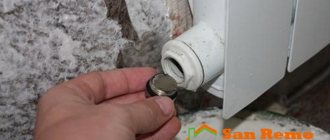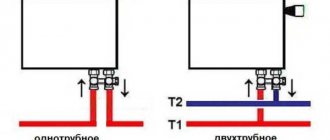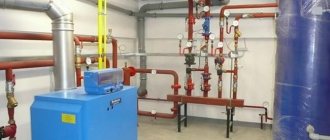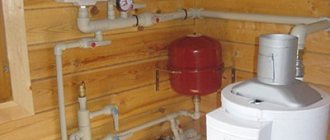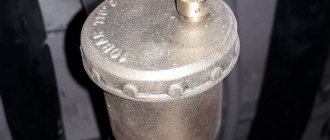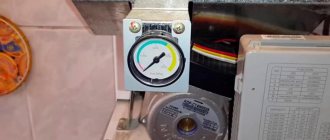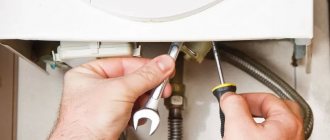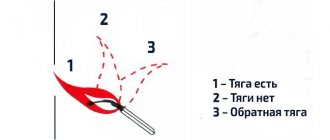Hissing and whistling
If the radiator hisses or whistles, this is a sign of a water leak. Moreover, the location of the leak can be anywhere in the heating system. Sometimes water comes out in a heating pipe embedded in the wall, and the sound comes from a radiator 10 meters away.
If you live in a multi-storey building and have not found an obvious leak in your apartment, talk to your neighbors. Maybe somewhere in a secluded corner they have already accumulated a puddle. If you can't find an obvious place, you should check:
- Parts of pipes embedded in ceilings and walls;
- Common riser;
- Places where the riser passes through the ceilings.
In a private home, also check all heating system equipment. From pumps to heat sources.
The risers are humming
Most often, residents of apartment buildings complain about a uniform hum or whistle. So why are heating pipes humming?
There are only two main reasons for such noise: a leak in the heating system or a narrowing that prevents circulation, through which a large volume of water passes with difficulty.
Leaks and working vents
Let's use the most reliable tool: logic. If there is a leak somewhere in the heating system a short distance from the apartment, it means that a large amount of hot water is flowing into one of the adjacent rooms.
It's quite difficult not to notice this. So, we have to raid our neighbors. Waterproofing the floors, alas, does not protect against leaks from the upper floors, so if the house has at least half of the neighbors on the riser, the search will not be long.
Heating riser fistula
However, let's assume that all neighbors have dry floors; however, the nerve-wracking whistling continues.
Well, let's take a flashlight and go to the basement.
If we are met by clouds of steam, the investigation can be considered complete: all that remains is to find the location of the leak and eliminate the leak, be it an open vent valve on the riser or a fistula in the drain pipe (horizontal heating distribution pipe).
The fistula, by the way, may well be hidden under thick thermal insulation: all we will see in this case is a stream of hot water running to the ground. Well, we remove the thermal insulation and look for a leak...
Murmuring, rustling. Gurgling, sound of pouring water
When such sounds appear, the reasons may be the following:
- The appearance of an air lock;
- Debris in the heating system;
- Bad gaskets.
Airing of the heating system is the most common problem with the appearance of extraneous sounds in the system. Air may appear due to poor quality water or coolant. This is especially true for aluminum radiators. Water with high acidity and alkalinity reacts with the metal and releases gas, which creates a plug.
The second reason for the appearance of air is poor-quality coolant. Over time, it can begin to break down and release oxygen or other gases (sometimes harmful to health).
It is not difficult to detect an air lock in the radiator. It is enough to touch it with your hand from above and below. If the top part of the battery is less heated, air or gas has accumulated there.
If a Mayevsky valve is installed on the batteries, bleed the air from each individual radiator. After that, wait 15-20 minutes and repeat the process. If there is no Mayevsky crane, the process will become more complicated. Read more about this in the article “How to properly bleed air from a heating battery with your own hands.”
Debris in batteries can appear for several reasons:
- Poorly purified water in the heating system;
- Decomposition of the coolant with the release of solid particles;
- Corrosion of the internal walls of radiators;
Small particles of rust and sand rub and hit the inner walls of the batteries, as a result of which an extraneous sound appears, such as rustling or rustling. The only way out is to flush the heating radiators.
Destruction of gaskets can occur due to:
- They are of low quality;
- Highly acidic waters;
- Aggressive coolant;
- Flushing the system with strong detergents.
In this case, the only option is to replace the gaskets. Moreover, they need to be changed not only at the inlet and outlet of the radiator pipes, but also between sections.
Batteries click, shoot, knock
If a thermostat (thermal valve) is installed in the heating system, this may be the reason. Check if it is positioned correctly. On its body there should be an indicator of the direction of water or coolant flow (see photo). The only option to get rid of the knocking noise in the battery is to remove it and put it in the right direction.
Don't be lazy! Check right now whether the regulators in your apartment or house are installed correctly
Sometimes pipes may knock. This happens when they are located too close to a wall or furniture. Due to strong pressure, the heating system may begin to vibrate. Moreover, this is not always noticeable to the eye. You can solve the problem by wrapping the pipe in insulation or a thin piece of rubber.
How to remove an air lock with your own hands
Air in the system after a long stop is common. This problem arises not only in the private sector, but also in apartment buildings. It's quite easy to solve.
Heating radiators are equipped with Mayevsky taps located at the ends of the radiators. This could be a valve or a fitting with a notch for a screwdriver.
- armed with a small container (for draining water), you need to unscrew the tap and let out the air;
- Actions should be performed carefully so as not to get burned by the escaping steam;
- when water comes out of the hole, close the valve;
- Such manipulations are carried out on each battery.
This eliminates noise and allows the coolant to move freely through the system, evenly releasing heat.
Noise, hum, buzzing, extraneous sounds
There can be many reasons for constant noise in heating radiators. Let's look at them in order:
Wrong pipe diameter
Sometimes heating pipes are of different diameters and are connected by adapters. Because of this, a pressure drop occurs and turbulence appears in the water or coolant. They lead to vibration and extraneous sounds.
Often a change in diameter occurs due to clogged pipes. Sediments can accumulate on their inner walls. This results in reduced throughput.
The only way to solve the problem is to cut off the old pipes and install new ones.
Pressure drops
Due to pressure surges in the heating system, vibration may occur. The reason for this is uneven operation of the circulation pump.
If you live in an apartment building, you can install a bypass. It will help compensate for pressure changes. But it is best to contact the utility companies.
If you have your own heating system, perform diagnostics and maintenance of the circulation pump. And best of all, call a specialist. This can be done using the service for selecting private specialists PROFI.RU .
Flow rate
Some people incorrectly calculate the number of radiator sections. Because of this, it is cold in the house or apartment in winter. To compensate for this moment, you can increase the flow rate of water or coolant. But at the same time, unwanted vibrations will occur in the radiators.
Incorrect pipe laying
Many people hide heating pipes in the wall, but do it incorrectly. They simply lay them in a groove, and then cement or plaster them. As a result, the pipe remains rigidly fixed.
Due to heating and cooling, the diameter of the pipe changes. Cracks appear in the concrete and cavities form. They work as a resonator and amplify the sound of water or coolant flowing through the heating system. A hum or buzz appears, the source of which is difficult to detect.
Methods for finding a faulty tap
To identify an apartment with faulty taps, you need to turn them off one by one from the hot and cold water pipes and listen to whether the unpleasant sound has disappeared or not. As soon as the hum in the pipes stopped, an apartment with faulty plumbing was found.
If you checked each of the apartments in the house using the method described above, and the problem was not solved, it is likely that the sound is caused by the installation of a valve blocking the riser. You can test this hypothesis by turning off the taps supplying water to this riser. If the sound disappears, then the problem lies with the riser valve.
Remember also that if you have a branched water supply system in your basement, containing many valves and valves, any shut-off valves can cause a hum. In this case, determining the cause of unpleasant sounds without an experienced plumber can be very difficult and not as quickly as we would like.
If the cause was still localized, consider yourself lucky. With simple repairs it can be easily eliminated.
Let's sum it up
From this article you learned why batteries make noise in an apartment or private house. We have identified the main reasons for the appearance of extraneous sounds:
- Incorrect pipe diameter;
- Incorrect pipe installation;
- Pressure changes;
- Air jams;
- Mounting brackets;
- Thermostat;
- Circulation pump;
- High coolant speed;
- System littering;
- Embedding pipes into the wall;
- Water leak;
- Wear of gaskets;
- Coolant;
- Depreciation of equipment.
We hope that the article was useful to you. Leave your opinions and questions in the comments. Don't forget to share the post with your friends!
Noisy radiators are an unnatural phenomenon that causes significant discomfort to residents of a private home. The volume of crackling, splashing, and gurgling noises is not always evenly distributed throughout the system.
Some rooms of the house do not suffer, while in some rooms it is simply impossible to be present. The problem is aggravated by the use of metal elements when installing radiators - metal conducts vibrations well , making the hum loud and ubiquitous.
Identifying the cause of noise is a priority task, since extraneous sounds indicate disruptions in the functioning of a system that is vital in the cold season. Some of the reasons left unattended will lead to failure of the heating circuit , accident or major property damage.
Why do heating radiators make noise in a private house?
Batteries in a private home make noise for various reasons . The breakdown can be corrected only after it is known exactly why the radiators are noisy.
Overpressure
Radiator noises caused by excessive pressure inside the entire installation signal the danger of a breakthrough.
Technical communications are designed for a certain operating pressure, which is controlled using sensors - pressure gauges .
Based on the standard indicators specified for a specific circuit of heating systems, you can adjust the pressure pumped by the pump yourself.
Incorrect installation of thermal valve
The home master does not see the difference which side to install the battery shut-off valve. But if the thermal valve is installed incorrectly, hot water pressure occurs on the valve , causing noise. Such a tap may tap periodically.
Pump noise in the boiler room
In the past, it was common practice to locate pumping equipment in a separate building to reduce the volume of sound it produced . Modern pumps are located in the basement of private houses.
Their work has been improved to such an extent that maximum efficient use of the heating circuit is possible with minimal hearing discomfort.
Photo 1. Pumps in a boiler room located in a semi-basement room can cause vibration and noise from radiators.
But incorrectly selected pump power is reflected in the appearance of constant noise from radiators and pipes. Metal communications perfectly transmit the vibrations of a powerful supercharger throughout a private home.
Attention! To prevent this effect, you need to adjust (reduce) the power of the pump, and before installing it, coordinate its performance with specialists.
Incorrect boiler operation
Monitoring the correct functioning of the device eliminates the hassle of battery operation and failure. The first sign of a boiler malfunction is the appearance of extraneous sounds.
To eliminate the defect, the modes of turning on and off the heating apparatus are adjusted.
The frequency of mode changes occurs once every 20–40 minutes. Good operating performance indicators are 75–80% of the boiler’s rated power.
A good solution to the problem is to install automatic room regulators that independently control the boiler power by measuring the temperature on a specific radiator.
Uneven supply pipes
When installing a system of “communicating vessels” in a private house, the laws of hydrostatics are strictly observed . All installation work is carried out using a level - a device that controls the parallelism and perpendicularity of the heating circuit elements to the level of the earth's surface. Pipes installed at an angle create an unnecessary difference in water level , causing splashing inside them.
Battery displacement when heated
The radiator is attached to the wall on special brackets, which are made of metal with lower thermal conductivity than the batteries themselves.
This protects the stands from unnecessary heating, which reduces the temperature of the entire heating system of a private home.
The material of the brackets is subject to little thermal expansion.
And heating radiators are sensitive to changes in coolant temperature. A material with high thermal conductivity expands significantly when heated . The junctions of such different elements often crack and click.
Reference! To prevent contact of parts, the occurrence of noise and subsequent corrosion of the metal in these places of the battery, elastic gaskets are used. Rubber washers work best
Change in coolant temperature
Malfunctions of the circuit system also occur due to a mismatch in the power of the heating unit.
The degree of heating in the battery is adjustable, but it is better to carefully select all elements of the heating system in advance.
If the boiler is designed for 2 kilowatts , and the total power of the radiators is 1 kilowatt , then this will periodically lead to malfunctions in the circuit, voltage in the pipes, and noise.
The material from which the batteries and pipes are made is also taken into account. Previously, cast iron , which withstood changes in the heating system.
Now other materials are common, less resistant to increased temperatures, although more attractive due to other characteristics.
And the neighbors are noisy too
More often than not, it's not just you and your family who suffer this. Therefore, you first need to go around the neighbors along the riser to identify the location of the noise.
Let's find out where the pipes are making noise
Now, as for the nature of the buzz. Heating pipes, like water pipes, can emit single or rhythmic sounds, something like tap dancing, rustling, gurgling, or even generally vibrate and even hum – periodically or constantly. The reasons can be completely different, they are even classified into groups. But now we will not consider absolutely all of them, but will focus only on impact noise effects.
Note: The likelihood of noise in pipes is sharply reduced if you use metal-plastic or plastic pipes instead of metal and copper. This is explained by the high sensitivity of steel pipes to low-frequency vibrations and high rigidity. Although their material is much stronger. It is recommended to use ball valves rather than screw valves as shut-off valves, which are controlled by turning the handle. These are heavy cast copper products, not Chinese-made products made from light alloy material.
The radiator clicks and knocks: causes of crackling, knocking and clicking
Specific sounds in the heating system are created by the presence of foreign particles. Many people reject this possibility, since in a private house the heating circuit is looped and is a closed system with a small coolant turnover. But the appearance of debris in batteries, which causes them to knock, is a cumulative phenomenon.
The water used for heating does not pass through filters, but is taken from a regular water supply. With constant heating, metal salts settle on the walls of pipes and batteries, forming scale .
Tearing off under the pressure of water, the particles move from place to place, as if they click.
For a private home, eliminating the problem of cracking, knocking and clicking in the battery is much easier than for an apartment building. Almost any owner can do this on his own. The coolant is drained into the sewer system through the inlet valve . The heating circuit and adjacent communications are washed with clean water. Then the coolant is replenished again.
If the valve malfunctions, simply replacing the obsolete element is sufficient.
Methods for cleaning radiators from dirt
During operation of the heating system, dirt accumulates in it: iron oxides, dissolved salts and possible mechanical impurities. But if water moves through the pipes at high speed, then in the radiators the process slows down and the sedimentation of suspended matter increases. Therefore, cleaning radiators is a must.
There are two methods: flushing the entire system together and disconnecting the batteries and cleaning using a compressor unit. Favorable conditions are created in the batteries for the accumulation of dirt, since the coolant slows down the movement in them. To flush, the radiator is connected to the compressor, and dirt is cleaned from it with water pressure.
If you carry out annual preventive maintenance of the entire system, then drastic measures will not be required. It is quite possible to limit yourself to a general flushing of the entire heating circuit with ordinary water. Chemical reagents are used in cases where the coolant does not meet the established parameters and significant deposits of salts and scale appear on the working elements.
After using chemicals, leaks may form in radiators and cracks may appear that were successfully covered with dirt.
To avoid an emergency, all equipment must be checked for functionality before starting the system.
Timely preventive maintenance of all components of the heating system will protect it from complex accidents and save the budget. Find out how to insulate the foundation base from the outside with penoplex at the link.
Murmuring of water in batteries and methods of elimination
Water in batteries can gurgle for various reasons. To determine, you need to know the features of radiators.
Leaky connections
Air bubbles create splashing and murmurs that frighten the owners of the house. The main reason for the appearance is the lack of tightness in threaded connections. The heating circuit almost always sucks air A kind owner knows this feature and monitors the condition of valves and pipe joints for integrity and tightness.
Results
Self-diagnosis of the causes of noise in batteries is a troublesome task for the average person. It is difficult to accurately determine the causes of malfunctions , since the heating system of a private house is autonomous and closed. It is better to immediately contact specialists. They will quickly and accurately find the problem and fix it efficiently.
Good afternoon, my dear regular reader! Today I will look at the reasons why heating radiators make noise in an apartment and how to deal with it.
If you are the happy owner of your own apartment, then most likely you are also the owner of pipes and radiators connected to the centralized heating system of an apartment building. You are not involved in the boiler, fuel, installation and configuration of a complex engineering system.
Often apartments do not have thermostats, and sometimes even valves before and after the radiator. Pipes and radiators only need to be washed occasionally. It would seem that this is the least troublesome heating option. But what to do if the apartment is suddenly filled with unusual, not very loud, but ominous sounds that make it difficult to sleep?
Video
By watching the video, you can find out why the circulation pump is noisy and what needs to be done.
Evgeniy Afanasyev chief editor
Author of publication 08.11.2018
Did you like the article? Save so you don't lose!
Why do heating radiators make noise in an apartment or house and what to do? Do you want to get rid of extraneous sounds? Don't you like it when heating radiators click, shoot, hum, hiss?
In this publication we will look at all the problem options and their solutions . After reading it, you will be able to independently determine the cause of noise in the batteries. You will also learn how to get rid of extraneous noise in heating radiators.
Types and causes of sounds in heating system pipes
There are many different types of sounds a central heating system makes and even more reasons why it is noisy. Below I will look at the sounds made by heating structures and the causes of noisy pipes.
It should be borne in mind that when the pipelines are filled with water (most often in September) and in the first days after starting the heating, you will hear gurgling, gurgling, whistling, rustling, and hissing sounds. The heating system will stop making noise when it is full, the air will be vented from it, then the remaining dissolved air will be vented. It is impossible to start the heating system silently, you just need to be patient.
But if the sounds continue to bother you a week after filling the heating pipelines or the pipes suddenly begin to make noise in the middle of the heating season, it is necessary to take adequate measures, from solving the problem yourself to contacting utility services (sometimes collectively).
Buzzing
The humming of risers is the most common defect in a heating system. A uniform monotonous but clearly audible hum has a very depressing effect on the psyche. Pipes hum for several reasons:
- Restriction in the heating system - installation of pipes of different diameters, a half-open tap or valve.
- A leak.
- Plumbers' bungling. For example, sometimes careless employees of the housing and communal services sector leave a drain in the basement that is not completely blocked, or there is noticeable leakage from a faulty valve or from leaky joints when installing shut-off valves at the inlet, etc.
- The original behavior of the neighbors at the entrance - there are people who constantly drain water from the radiators. So they increase the heating temperature of the batteries, wash them, even use warm water for household needs, although the liquid treated with chemicals is dangerous. But the reagents reduce the amount of scale in boilers and pumps.
If the humming occurs at a specific moment and the pipes do not stop making noise, you should urgently look for a leak - at home, walk around your neighbors, go and inspect the sun loungers and the elevator in the basement. Then fix the leak on your own or with the help of utility workers.
If the leak is not found, it is worth looking for restrictions - a half-closed tap or a failed valve on the heating radiator. You will have to navigate by ear.
If radiators are noisy due to the non-standard behavior of neighbors, it can take a long time to find the cause. It is even more difficult to neutralize neighbors.
Sometimes the heating system makes a very faint, but almost constant, debilitating hum. The reason is vibration due to improper operation of the pump. It is debugged or repaired by utility workers.
Whistling
Whistling occurs when vibration from the pump resonates and when taps and valves are damaged. Radiators will stop making noise when utility workers eliminate the vibration.
If a faucet or valve whistles, then when you rotate the handle, the whistle will decrease or increase. Most often, a whistle occurs during the initial destruction of the sealing elements, although sometimes a normally operating new valve/faucet whistles in one of the positions. The whistling can be eliminated by repairing or replacing the valve (tap).
Howling occurs when there is strong vibration of pipes associated with shocks during pump operation. Only utility workers can deal with this issue, and your concern is to motivate them, preferably collectively, otherwise over time the noise will become louder and louder.
Murmuring
The noise of flowing water in the pipes can be heard if the heating is not completely filled, and the water seems to flow down the walls of the pipeline. The heating system gurgles when air gets into it - when coolant is added, when the pump seal, shut-off and control valves are leaking, or leaks. The murmur can be heard several floors away.
Sources of noise
Pipes in a heating system can make noise for several reasons:
- External problems - vibration from the pump, resonance in the elevator unit, leaks in the basements.
- The heating structures themselves - poor fastening, improper installation, ingress of debris and scale, incorrect installation of taps and valves, destruction of shut-off valves, leaks.
- Incorrect operation.
You can also add airing: it very often appears due to leaks or poor sealing at the joints of pipelines with shut-off valves and a pump.
Expert advice on preventing extraneous noise and sounds
Some types of noise in heating communications can be removed independently or their occurrence can be prevented during the design and installation of heating.
If the batteries in a multi-storey building are connected without a bypass, during repairs it is impossible to change the pipes to communications of a smaller diameter. You cannot turn off the radiator using taps - you will leave your neighbors without heating, and they will not thank you for it. If there is no bypass, thermostatic valves cannot be used.
The recommendation of experienced plumbers is to use radiator taps, not radiator valves. Their design is more reliable, there is less hydraulic resistance, and there is no stagnant zone where debris accumulates. It is also better not to install valves. The advantage of using ball radiator valves is that the direction of water flow does not matter to them. In case of incorrect installation, the direction of the coolant flow will not affect them.
The video shows some ways to get rid of noisy heating pipes.
Where can I complain?
Normally, pipes and batteries should not make noise. If the sounds are disturbing, you must first contact the house management company with a written complaint. If measures are not taken, you can complain sequentially to the following organizations:
- local body of the State Housing Inspectorate;
- local branch of Rospotrebnadzor;
- local authorities;
- prosecutor's office
If the owner of the living space entrusted the installation of the radiator not to the management company, but to other organizations, he must contact them. Problems may arise if there is no legal act of acceptance of work. In this case, the service of a heating engineer will be paid. In some cases, it is necessary to reconfigure the entire heating system.
If a defect is discovered in the radiator, and the certificate of acceptance of the radiator into operation issued by the organization that installed or replaced it has been preserved, and the warranty period has not yet expired, you can request that this organization carry out diagnostics and free repairs.
